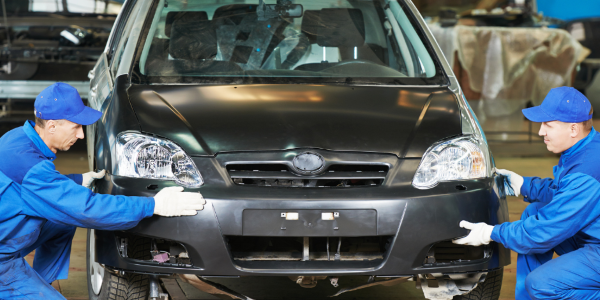Should I repair my car after an accident?
You’ve just been involved in an accident where you hit someone with your car. It’s crucial to ensure that your vehicle is safe to drive before using it again. Even if the damage seems minor, you should have a professional inspection. They will assess any potential issues that may compromise the safety of the vehicle.
Reasons To Repair Your Car
- Safety Concerns: Even seemingly minor damage can hide underlying issues that could compromise the safety of your vehicle. For example, damage to the frame or suspension might not be immediately apparent. But it could affect the car’s handling and stability. By having a professional inspection, you can uncover any hidden damage and address it before it leads to a more significant problem or another accident.
- Legal Obligations: Laws and regulations regarding vehicle safety and maintenance vary by jurisdiction. Many places have requirements for repairing vehicles involved in accidents, especially if they result in injuries or significant damage. Ignoring these legal obligations can lead to fines, penalties, or even legal consequences if the unsafe vehicle causes another accident.
- Moral Responsibility: If you’re at fault for the accident, repairing your vehicle is not just a legal requirement but also a moral obligation. Taking responsibility for your actions means ensuring that any damage you caused is rectified to the best of your ability. This includes repairing your vehicle to prevent further harm to others on the road. This also makes amends for any injuries or inconvenience caused.
- Insurance Considerations: Failing to repair your vehicle after an accident could have implications for your insurance coverage. Insurance companies may deny coverage for future claims related to the same accident if they find that you neglected to repair your vehicle properly. This could leave you personally liable for any damages or injuries resulting from subsequent incidents.
Reasons To NOT Repair Your Car
There are situations where it might be financially advantageous not to repair your car. But they are typically rare and specific to certain circumstances. Consider these scenarios where you might choose not to repair your car:
- Insurance Coverage: If the cost of repairs exceeds the value of the car, your insurance company might declare it a total loss. In such cases, they may offer you a settlement based on the car’s actual cash value. If this settlement is sufficient for you to purchase a replacement vehicle or cover your needs, you might opt not to repair the car.
- Older Cars with Minimal Damage: If your car is old and the damage is cosmetic or minor, you may decide to skip repairs, especially if it runs well and the repair costs outweigh the car’s value.
- DIY Repairs: Some car owners can repair vehicles themselves or access affordable repair options. In these cases, if the damage is minor and inexpensive to fix, skipping professional repairs can make financial sense.
- Limited Use: If the damage does not affect the car’s drivability and you don’t rely heavily on the vehicle for transportation, you might choose not to repair it immediately and continue using it until repairs become necessary or until you can afford them.
It’s essential to consider the safety implications of not repairing your car, especially if it’s been involved in an accident. Driving a damaged vehicle can pose risks not only to yourself but also to others on the road. Additionally, some jurisdictions have laws mandating repairs for certain types of damage or accidents.
Before deciding not to repair your car, carefully weigh the financial considerations against safety and legal obligations. Consulting with a trusted body shop or insurance agent can provide valuable guidance based on your specific situation.
If you need help deciding, feel free to reach out to Sharp Auto Body today at 847-526-1343.








